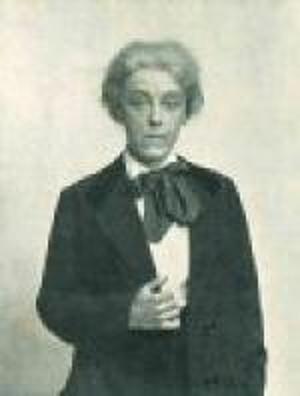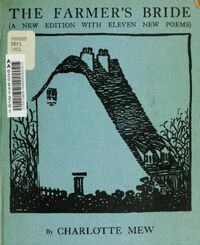
Charlotte Mew (1869-1928). Courtesy Carcanet Press.
Charlotte Mary Mew (15 November 1869 - 24 March 1928) was an English poet, whose work spans the cusp between Victorian poetry and Modernism.
Life[]
Mew was born in Bloomsbury, London the daughter of architect Frederick Mew (who designed Hampstead town hall)[1] and Anna (Kendall).[2]
She attended Lucy Harrison's School for Girls and lectures at University College London. [3]
Her father died in 1898 without making adequate provision for his family. 2 of her siblings suffered from mental illness, and were institutionalized, and 3 others died in early childhood, leaving Charlotte, her mother and her sister, Anne. Charlotte and Anne made a pact never to marry for fear of passing on insanity to their children. (An author calls Charlotte "chastely lesbian".[4]) Through most of her adult life, Mew wore masculine attire and kept her hair short, adopting the appearance of a dandy. [5]
In 1894, Mew succeeded in getting a short story into The Yellow Book,[6] but wrote very little poetry at this time. Her debut collection of poetry, The Farmer's Bride, was published in 1916, in chapbook format, by the Poetry Bookshop; in the United States, her 2nd collection was entitled Saturday Market and published in 1921 by Macmillan. It earned her the admiration of Sydney Cockerell.
Mew gained the patronage of several literary figures, notably Thomas Hardy, who called her the best woman poet of her day; Virginia Woolf, who said she was 'very good and quite unlike anyone else'; and Siegfried Sassoon.
After the death of her sister from cancer in 1927, she descended into a depression. In 1928 she was admitted to a nursing home, where she eventually committed suicide by drinking a bottle of Lysol disinfectant.[7]
Mew is buried in the northern part of Hampstead Cemetery, London.
Writing[]
Her poems are varied: some of them (such as 'Madeleine in Church') are passionate discussions of faith and the possibility of belief in God; others are proto-modernist in form and atmosphere ('In Nunhead Cemetery'). Many of her poems are in the form of dramatic monologues, often from the point of view of a male persona ('The Farmer's Bride'). 2 concern mental illness - "Ken" and "On the Asylum Road."
Humbert Wolfe: ""She has no tricks or graces. She is completely mistress of her instrument, but she does not use it for any but the most austere purpose.... All that she wrote had its quality of depth and stillness. No English poet had less pretensions, and few as genuine a claim to be in touch with the source of poetry."[8]
Recognition[]
She obtained a small Civil List pension with the aid of Cockerell, Hardy, John Masefield, and Walter de la Mare.
Publications[]
Poetry[]
- The Farmer's Bride. London: Poetry Bookshop, 1916
- revised (with 11 new poems). London: Poetry Bookshop, 1921
- published in U.S. as Saturday Market. New York: Macmillan, 1921.
- The Rambling Sailor (edited by Alida Monro). London: Poetry Bookshop, 1929.[8]
- Collected Poems (edited, with a memoir, by Alida Monro). London: Duckworth, 1953; London: Macmillan, 1954.[8]
- Penelope Fitzgerald, Charlotte Mew and Her Friends: With a selection of her poems. Reading, MA: Addison-Wesley, 1988.
- Selected Poems (edited by Ian Hamilton). London: Bloomsbury, 1999.
- Complete Poems (edited by John Newton). London: Penguin, 2000.
- Selected Poems (edited by Eavan Boland). Manchester, UK: Carcanet, 2008.
- Poems (edited by Anthony Astbury). Warwick, UK: Greville Press, 2011.
Collected editions[]
- Collected Poems and Prose (edited by Val Warner). Manchester, UK: Carcanet / London: Virago, 1981.
Except where noted, bibliographical information courtesy WorldCat.[9]
Poems by Charlotte Mew[]

"The Farmer's Bride" by Charlotte Mew (read by Tom O'Bedlam)
See also[]
References[]
- Penelope Fitzgerald], Charlotte Mew and Her Friends. Flamingo, 2002.
- Dictionary of Literary Biography, Vol. 19: British Poets, 1880-1914. London, 1983
Notes[]
- ↑ Hampstead - Local Government | British History Online
- ↑ Warner, Val, ed. Collected Poems and Selected Prose of Charlotte Mews. New York: Routledge, 2003, p. ix.
- ↑ Spender, Dale and Janet Todd, ed. British Women Writers: An anthology from the fourteenth century to the present. New York: Bedrick Books, 1989, 695.
- ↑ Rice, Nelljean McConeghey (2003). A New Matrix for Modernism: A Study of the Lives and Poetry of Charlotte Mew and Anna Wikham. Routledge. p. 35. ISBN 0415941407
- ↑ Rice, p. 6
- ↑ Mew, Charlotte M. (1894). Passed. The Yellow Book. 2. London: Elkin Mathews & John Lane. pp. 121-41. http://en.wikisource.org/wiki/The_Yellow_Book/Volume_2/Passed.
- ↑ Alix North, Charlotte Mew 1879-1928, Isle of Lesbos. Web, Dec. 13, 2014.
- ↑ 8.0 8.1 8.2 Charlotte Mew 1870-1928, Poetry Foundation, Web, Nov. 11, 2012.
- ↑ Search results = au:Charlotte Mew, WorldCat, OCLC Online Computer Library Center Inc. Web, Dec. 13, 2014.
External links[]
- Poems
- Charlotte Mew (1870-1928) at the Poetry Foundation
- 3 poems by Mew: "I So Liked Spring," "In the Fields," "The Farmer's Bride"
- Poem of the Week: "The Farmer's Bride" at The Guardian
- Charlotte Mew 1879-1928 at Isle of Lesbos (profile & 5 poems)
- Charlotte Mew at Spondee.net (profile & 13 poems)
- Charlotte Mary Mew at PoemHunter (30 poems)
- Charlotte Mew at Poetry Nook (57 poems)
- Audio / video
- Books
- Charlotte Mew at Amazon.com
- About
- Charlotte Mew in the Encyclopædia Britannica
- Charlotte Mew Chronology
- Charlotte Mew in her own words
- "An Imp with Brains: The forgotten genius of Charlotte Mew" at the New Statesman
- "Lotti's Leap": review of Collected Poems and Prose in the London Review of Books
- "Mary Magdalene and the Bride: The work of Charlotte Mew" by Val Warner, Poetry Nation
- "Lotti's Leap" by Penelope Fitzgerald - review of Collected Poems and Prose
| This page uses Creative Commons Licensed content from Wikipedia. (view article). (view authors). |
|
